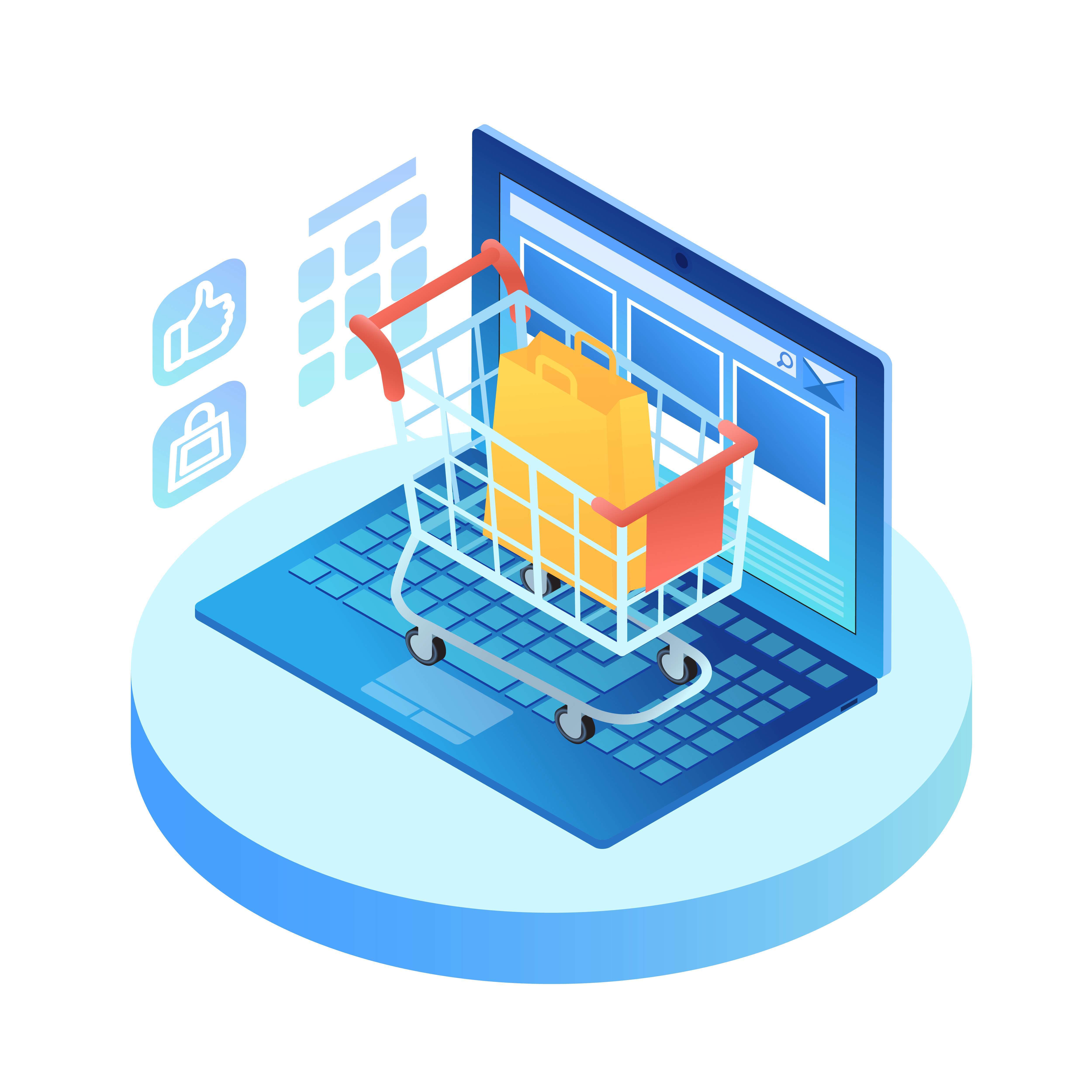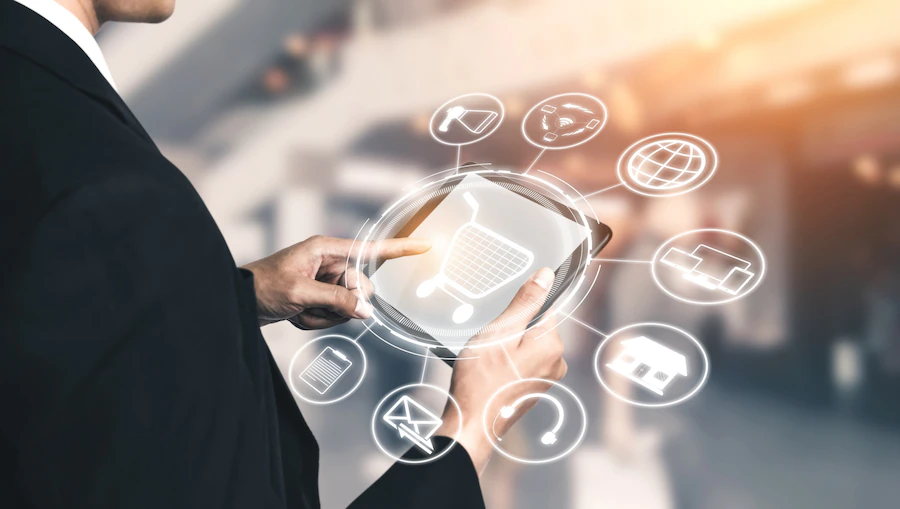Author: Soham suthar
Date: 04-12-2024

Businesses are constantly searching for methods to keep ahead of the curve as 2024 draws near because the e-commerce industry is changing at a never-before-seen rate. Specifically, business-to-consumer (B2C) e-commerce applications are becoming a crucial component of the shopping experience, influencing how consumers interact with businesses and make purchases. We anticipate that evolving consumer behavior and cutting-edge technologies will further redefine the future of business to consumers (B2C) e-commerce apps by pushing towards mobile commerce.
This article will discuss the main predictions for B2C e-commerce applications in 2024, along with the trends and technologies expected to revolutionize the market. This tutorial will give you an idea of what to anticipate and how to remain ahead of the competition whether you are a business owner or are considering developing an e-commerce app. Let's explore what B2C e-commerce apps will look like in the future!
1. Mobile-First Shopping Experience
Businesses must give mobile-first experiences top priority as mobile usage continues to soar. Developing mobile apps is quickly taking over as the main way that companies interact with their clientele, particularly in business-to-consumer (B2C) e-commerce.
Why Mobile-First is Essential
- Customers use mobile devices more frequently: Recent reports attribute mobile commerce, or m-commerce, to more than 70% of all e-commerce sales worldwide.
- Convenience and accessibility: Because smartphones make it easy to browse and buy things while on the go, customers prefer to purchase them.
- Personalized Shopping Experience: By using user data to recommend goods, deals, and discounts based on user preferences, mobile apps enable greater personalization.
Key Features of Mobile-First E-commerce Apps:
- Responsive design: To function flawlessly across a variety of screens and devices.
- One-Click Checkout: Lowering cart abandonment rates requires streamlining the checkout procedure.
- Push Notifications: Real-time notifications to clients about sales, discounts, and new products.
2. The Rise of Artificial Intelligence and Machine Learning
Machine learning (ML) and artificial intelligence (AI) have revolutionized B2C e-commerce applications. Brands are using these technologies to automate procedures, provide individualized experiences, and make unrivaled predictions about consumer behavior.
AI-Powered Personalization
AI systems are able to make personalized product recommendations by examining user behaviors, preferences, and past purchases. With the aid of machine learning, the app gains knowledge from every encounter and gradually enhances its suggestions.
Predictive Analytics
Businesses may make data-driven decisions by using AI and ML to analyze trends and anticipate future consumer behaviors. This can assist in anticipating demand, optimizing inventories, and using customized marketing techniques to target the appropriate customers.
E-commerce Apps with AI Features:
- Chatbots for Customer Service: Automated chatbots help consumers around the clock by responding to their questions and assisting them with the purchasing process.
- Visual Search: By enabling customers to contribute photographs and locate related products, AI-powered image recognition improves the buying experience.
3. Voice Commerce (V-Commerce)
Experts predict a significant expansion in voice commerce in 2024 due to the growing popularity of voice-activated gadgets such as Siri, Google Assistant, and Alexa. Voice commands are becoming an increasingly common way for consumers to make purchases.
Features of V-Commerce:
- Voice Search: Enabling voice commands for product searches will improve the user experience in general.
- Voice-Powered Shopping: Using voice commands, users may place orders, add products to their carts, and even ask questions about specific products.
Why V-Commerce is Gaining Popularity:
- Hands-Free Shopping: Voice commerce allows busy users to shop while multitasking, which is convenient.
- Efficiency and Speed: Voice commands speed up the shopping process compared to typing, especially for quick purchases.
4. Augmented Reality (AR) in E-Commerce Apps
Customers' interactions with products in e-commerce apps are about to undergo a radical change thanks to augmented reality (AR). AR technology is especially useful for sectors like furniture, fashion, and cosmetics since it enables customers to see things in real-world settings before making a purchase.
How AR Enhances the Shopping Experience:
- Virtual Try-Ons: This feature helps customers make better decisions and lowers the possibility of returns by allowing them to virtually try on clothing, shoes, and even makeup.
- Product Visualization: Augmented reality allows consumers to arrange furniture and other items in their homes to see how they fit and appear there.
Industries That Benefit from AR:
- Customers: Able to view how furniture will appear in their living spaces.
- Fashion: Before making a purchase, buyers can try on clothing or accessories in virtual fitting rooms.
- Beauty and Cosmetics: Makeup companies employ augmented reality (AR) to enable consumers to try makeup on their faces in real time.
5. Seamless Payment Integrations
Future B2C e-commerce apps will incorporate even more sophisticated payment mechanisms. Consumer demands for a smooth and safe payment experience will fuel the use of different payment methods.
Payment Trends in E-Commerce Apps:
- Digital wallets: Because of their speed and simplicity, digital wallets are growing in popularity as a result of the emergence of platforms like Apple Pay, Google Wallet, and PayPal.
- Cryptocurrency: Particularly in tech-savvy areas, cryptocurrencies such as Bitcoin are becoming more and more popular as e-commerce payment methods.
- Buy Now, Pay Later (BNPL): BNPL services, such as Klarna and Afterpay, are gaining traction because they give consumers flexible, interest-free payment choices.
Why Payment Integration is Important:
- Reducing cart abandonment: Requires a quick and easy checkout procedure.
- Security: Protecting sensitive financial data and fostering client trust are two benefits of integrating secure payment channels.
6.Sustainability and Eco-Friendly Practices
Customers are actively seeking sustainable items as their ecological concerns grow. To cater to this expanding market, B2C e-commerce apps will therefore need to implement more environmentally friendly procedures.
How E-Commerce Apps Can Support Sustainability:
- Eco-Friendly Products: The app's emphasis on sustainable products will meet the growing demand for ethical and environmentally friendly purchasing.
- Carbon Footprint tracking: A few apps are starting to incorporate tools that let users monitor the carbon impact of the things they buy.
- Sustainable Packaging: Encouraging environmentally friendly packaging choices can lessen waste and improve the brand's standing as a green company.
7. Advanced Analytics and Data-Driven Insights
By 2024, more and more B2C e-commerce apps will be using advanced analytics. Companies will use data to improve marketing strategies, expedite processes, and optimize user experiences.
The Role of Analytics in E-Commerce Apps:
- User Behavior Analysis: Analytics reveal which pages users visit, where they leave the app, and how they use it. This data optimizes the app's style and functionality.
- Sales Forecasting: Businesses can use predictive analytics to estimate demand and modify their marketing and inventory plans accordingly.
- Customer Segmentation: By using advanced analytics, companies will be able to divide up their clientele according to their preferences, purchasing patterns, and demographics, enabling more focused marketing campaigns.
8. Mobile App Development: Choosing the Right App Development Company
Selecting the best mobile app development company in India is essential for companies aiming to create scalable and reliable apps, as the future of B2C e-commerce apps grows more tech-driven. A skilled Indian app development company can incorporate the latest technologies such as AI, AR, and voice commerce into an app.
Why India is the Hub for App Development:
- Expertise: Some of the top developers with experience creating feature-rich, high-performing mobile apps are based in India.
- Cost-Effectiveness: For companies wishing to develop mobile apps without sacrificing quality, India provides affordable options.
- Innovation: Indian developers are skilled at integrating cutting-edge technologies such as AI, ML, AR, and blockchain into their apps.
How to Choose the Right App Development Partner:
- Portfolio and Experience: Seek out a business that has a history of creating e-commerce applications.
- Technology Expertise: Verify if the business is knowledgeable about the newest advancements in AI, AR, and machine learning.
- Support and Maintenance: To make sure the app remains current with market trends and security regulations, pick a provider that provides continuous support and maintenance.
Key Predictions for 2024: Table Summary
| Prediction | Impact on E-commerce | Technologies Involved |
|---|---|---|
| Mobile-First Shopping Experience | Increased sales and engagement due to convenience and accessibility on mobile devices. | Mobile apps, responsive design, push notifications. |
| AI & Machine Learning | Enhanced personalization and predictive analytics for better customer experiences. | AI, ML, data analytics, chatbots. |
| Voice Commerce | Allows hands-free shopping and quick purchases, especially on smart devices. | Voice assistants, voice search, NLP. |
| Augmented Reality | Enables customers to try products virtually, improving purchase decisions. | AR, computer vision, 3D modeling. |
| Seamless Payment Integrations | Faster checkouts and better user experience with a variety of payment options. | Digital wallets, BNPL, cryptocurrency. |
| Sustainability | Growth in eco-friendly products and sustainable shopping options. | Sustainability tracking, eco-friendly packaging. |
| Data-Driven Insights | Improved customer segmentation and sales forecasting for targeted marketing. | Analytics, big data, customer insights. |
Conclusion
The future of B2C e-commerce apps looks bright and filled with fresh innovations that enhance user experiences. Brands that can adopt cutting-edge technologies such as AI, AR, voice commerce, and sustainability practices will have a competitive advantage.
As we approach 2024, companies must focus on keeping their e-commerce apps mobile-friendly, user-centered, and data-driven while also exploring new and emerging trends in the digital marketplace. As more businesses adapt, expect these trends to shape how customers interact with e-commerce apps and make purchasing decisions.
Are you ready to launch your next e-commerce app? Stay ahead of the competition by incorporating these trends into your app development process today!
29Your choice of weapon
Build your Apps for any Platform
Latest Blogs

Your One Stop Shop for Excellence Top React Native Development Companies Compared
Posted On: 07-Jun-2024
Category: ecommerce

Unlock Your Business Potential with Custom E-Commerce Apps from India’s Best App Developers
Posted On: 15-Aug-2024
Category: ecommerce

E-commerce Development Essential Features for a Successful Online Store
Posted On: 03-Jun-2024
Category: ecommerce

5 Key Considerations for Building a Secure E-commerce Platform with Indian Development Teams
Posted On: 05-Jun-2024
Category: ecommerce

Building the Perfect E-commerce App: Features and Functionality to Drive Sales
Posted On: 30-May-2024
Category: ecommerce

The Future of Mobile Commerce How Mobile Apps are Transforming Shopping Experiences Shopping Made Easy
Posted On: 21-Jun-2024
Category: ecommerce
Related Services

Business-to-Consumer (B2C) E-commerce Apps | App Developers India
Posted On: 06-Sep-2024
Category: ecommerce

Customer Support App Development Company | Expert Developers
Posted On: 29-Sep-2024
Category: ecommerce

Custom Shopping App Development Services | App Developers India
Posted On: 29-Sep-2024
Category: ecommerce


Dropshipping E-commerce App Development | Dropshipping E-commerce App Developers
Posted On: 29-Sep-2024
Category: ecommerce

Top ECommerce App Development Company | ECommerce App Developers
Posted On: 29-Sep-2024
Category: ecommerce
We to code. It's our passion










you can also reach us at our given
email address or phone number.




